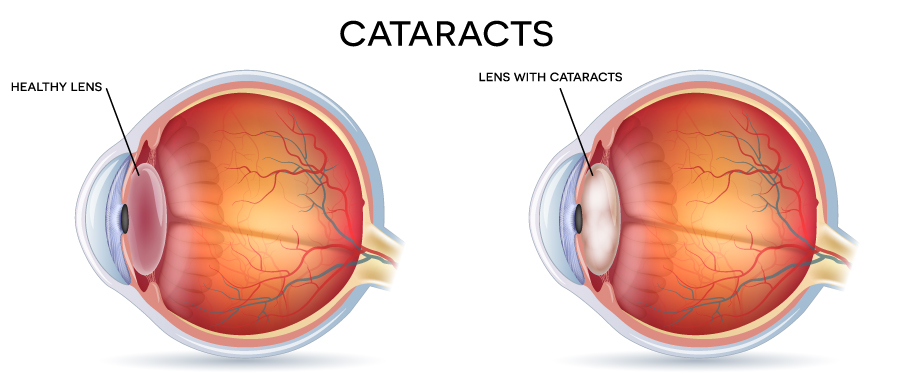Looking for information on cataracts? Here at Rosanova Eye, our Fellowship Trained cataract surgeon, Dr. Mark Rosanova can help you understand the natural aging of your lens, a cataract diagnosis and what they mean for your vision
What is a cataract?
A cataract is arbitrarily defined as the lens of the eye that has become so dysfunctional that it decreases the visual acuity to 20/40 or less – or about half of normal.
Before it reaches that random setpoint, you may have increasing problems with near vision, glare, night vision, visual perception.
The lens is a clear, flexible structure that helps the eye focus on objects at varying distances. A cataract begins developing when cloudy proteins permeate a lens that is already degenerating. This makes it progressively opaque. This process begins in your early 40s.

Clouding of the lens is a natural process that may be accelerated by certain diseases of the eyes of body or by certain medications. As more protein accumulates, the lens becomes more opaque and you have more difficulty reading the bottom of the eye chart. Under certain lighting conditions, it might be like looking thru a fogged up window.
Cataracts are painless but as they get worse, they can make it very hard to see. If left untreated, cataracts can cause severe vision loss or blindness. Cataracts are the number one cause of blindness in the world.
What is Dysfunctional Lens Syndrome?
As you pass 40, you start to notice loss of near vision and more optical aberrations, that is halos and tails/streaks on lights.
Past 50, your visual performance further deteriorates. You have a harder time up close, light scatters more causing your vision –even with glasses- to not be as sharp, It is more difficult to see clearly at night, you need more light to read, more contrast to see things and colors.
Past 65, visual quality gets even worse. Your color perception diminishes. More night vision problems. Doubling of letters. Glare and halos. Difficulty on sunny days.
At any of these stages, your vision may bother you significantly, but, technically, as long as you can read below the 20/40 eyechart line, you are not classified as having a “cataract.”
Previously, you would just have to live with your symptoms or pay out of pocket for a “Refractive Lens Exchange,” conceptually the same thing that happens with cataract surgery, removing the lens and replacing it with a new, artificial lens.
Recently, thanks to new cutting-edge diagnostic technology, we can now isolate and quantitate the light scatter, aberrations and distortions causing your symptoms. Thereby verifying and quantifying your visual disability.
What are the common dysfunctional lens/cataract symptoms?
- Blurry vision
- Excessive glare
- Seeing halos or streaks around light sources
- Light sensitivity
- More difficulty seeing at night versus during the day
- Trouble seeing contrast
- Yellowish or faded color vision
- Seeing double in one eye
The lens typically degenerates slowly and the symptoms are usually gradual in onset. As a threshold is finally crossed, they may seem to start suddenly.
The best way to diagnose Dysfunctional Lens Syndrome and cataract is to have annual eye exams. As soon as you turn 40, schedule an eye exam at least once every couple of years; after 60, every year. Timely eye exams ensure that dysfunctional lens and cataracts can be detected early and treated according to how much they are affecting you.
How do you get cataracts?
Cataracts are just one of many changes the body goes through as we get older. Other factors that can increase the risk of cataracts include diabetes, smoking-current or previous, obesity (BMI over 30), alcohol abuse, previous trauma, chronic exposure to UV light, use of prednisone/steroids and various other eye diseases.
Nuclear cataracts are most often tied to age. Cortical and subcapsular cataracts are usually linked to diabetes and other metabolic conditions. High or chronic steroid use typically causes posterior subcapsular cataracts. Bottom line, no matter what type or cause, they all add up to the same dysfunction.
Can you prevent cataracts?

The best way to lower your risk of cataracts is to live a healthy, active lifestyle. Lose weight. Seek support to quit smoking. Eat a diet rich in vitamins and antioxidants. Protect your eyes from the sun, and, most importantly, schedule annual eye exams.
When do you treat cataracts?
As the lens becomes progressively dysfunctional, causing the above symptoms and decreasing the visual acuity, a person’s daily activities are affected. Whether the affect is enough to bother someone, depends on the individual’s visual demands.
For instance, for a given set of symptoms and decreased vision: a 55-year-old airline pilot would be affected differently than a retired 73-year-old accountant. They each use their vision differently and each has unique needs in their ability to see without dysfunction and to see at certain levels of acuity.
The key is to help each patient assess these individual needs. Once a need is established, then we can develop a plan to fulfill those needs.
What happens during cataract surgery?
Please read our section on Cataract/Custom Cataract Surgery.
Is cataract surgery always necessary?
Dysfunctional lens/cataract surgery is rarely, absolutely needed to prevent further harm to the eye. New glasses can sometimes improve how far down you can read on the eye chart. However, as the lens continues to age and cloud, the glasses will probably have to be changed at shorter and shorter intervals. The improvement will be more and more limited.
As far as improving all the other symptoms of the aging/dysfunctional lens, glasses rarely help. Only a new, artificial intraocular lens (IOL) will help. There are currently no effective proven ways to stop or reverse the aging degeneration of the lens. If your cataracts are causing significant vision issues, cataract surgery is necessary to restore your eyesight.
Cataract Treatment at Rosanova Eye: Hoffman Estates, Barrington and Chicago, IL
We are dedicated and passionate about helping you to improve your vision and how clearly you see. We are committed to doing this as safely, effectively, efficiently, precisely and comfortably as possible.
Take our Cataract Self-Test or Contact us today to schedule an appointment to discuss your vision with Dr. Mark Rosanova.




